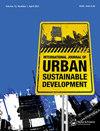Slum Upgrading beyond incubation: exploring the dilemmas of nation-wide large scale policy interventions in Brazil´s growth acceleration programme (PAC)
IF 2.4
Q3 ENVIRONMENTAL STUDIES
International Journal of Urban Sustainable Development
Pub Date : 2021-08-13
DOI:10.1080/19463138.2021.1958336
引用次数: 4
Abstract
Slum upgrading policies and practices have continued to interest both scholars and practitioners. The 2007 launch of the Brazilian Growth Acceleration Program (PAC) has added a new dimension to the debate. The latter represented an ambitious program of interventions, regulation and finance that articulated states and municipalities at national level around the development of local slum upgrading programmes, with a scope and scale that had never been achieved before in the country. Our main objective here is not to review the relative extensive and growing literature on slum upgrading in the Global South. Nevertheless, a few observations are in place to both situate our empirical analysis regarding the impact of PAC within the broader discussions on slum upgrading, as well as to argue how this paper contributes to the existing work in the field. A first strand of research has emphasised the evolution of national slum upgrading policies, often illustrated with the analysis of specific upgrading experiences in emblematic cities to reinforce the overall argument. This historical approach has stressed how initial slum clearance and removal has given place to ‘non-conventional’ strategies such as incremental housing, aided self-help, sites and services and the rolling out of upgrading programs. A number of authors have also claimed the more recent hollowing out of these ‘alternative’ approaches and the comeback of ‘conventional’ housing strategies through the provision of social market housing, or the emergence of urban entrepreneurialism through large urban redevelopment projects (Wakely 2015; Lindert, 2015; Dupont et al. 2016). This strand of work frequently combines broader historical research on tendencies of donors and national governments with paradigmatic upgrading experiences in specific flagship cities (Imparato and Ruster 2003; Burra 2005; Magalhâes 2016). Dupont et al. (2016), for example, analyse Rio de Janeiro, Delhi, Chennai, Durban, Cape Town and Lima in order to flesh out the mismatches between the design and implementation of upgrading and its subsequent undermining through urban neoliberalisation in Brazil, India, South Africa and Peru. Likewise, Ren (2017) combines detailed case studies in Rio, Bombay and Ghuangzhou in order to analyse how the inherent tensions between entrepreneurial urban governance and slum upgrading strategies are being played out in these countries. Along the same lines, Werlin (1999) provides an extensive overview of large-scale upgrading experiences in Calcutta, Jakarta and Manilla and argues that the ‘minimal state’ approach that was implicitly advocated by John Turner is unlikely to succeed in up-scaling policies in these countries (and the Global South as such) if issues such as land tenure, the finance-cost-recovery nexus and participation in the design, implementation and maintenance of projects are not taken into consideration. A second strand in the upgrading literature is focussed on detailed, sometimes comparative case studies on the limits and potentials of slum upgrading超越孵化的贫民窟改造:探索巴西增长加速计划(PAC)中全国性大规模政策干预的困境
贫民窟改造政策和实践一直引起学者和实践者的兴趣。2007年启动的巴西增长加速计划(PAC)为这场辩论增加了一个新的维度。后者是一项雄心勃勃的干预、监管和融资方案,将各州和市政当局在国家一级围绕当地贫民窟改造方案的发展联系起来,其范围和规模在该国是前所未有的。我们在这里的主要目的不是审查关于全球南方贫民窟改造的相对广泛和不断增长的文献。尽管如此,本文还是提出了一些意见,以便将我们对PAC影响的实证分析置于有关贫民窟改造的更广泛讨论中,并说明本文如何有助于该领域的现有工作。第一部分研究强调了国家贫民窟改造政策的演变,通常通过分析具有象征意义的城市的具体改造经验来说明,以加强整体论点。这种历史性的做法强调了最初的贫民窟清理和搬迁如何让位于“非常规”战略,如增加住房、援助自助、场地和服务以及推出升级计划。许多作者还声称,最近这些“替代”方法的空心化和“传统”住房战略的回归,通过提供社会市场住房,或者通过大型城市重建项目出现城市企业家精神(Wakely 2015;兰德博士,2015;Dupont et al. 2016)。这一系列工作经常将捐助者和国家政府倾向的更广泛的历史研究与特定旗舰城市的范例升级经验结合起来(Imparato和Ruster 2003;巴拉2005;Magalhaes 2016)。例如,杜邦等人(2016)分析了里约热内卢、德里、金奈、德班、开普敦和利马,以充实巴西、印度、南非和秘鲁的城市新自由主义化的设计和实施与随后的破坏之间的不匹配。同样,Ren(2017)结合了里约、孟买和广州的详细案例研究,以分析企业家城市治理和贫民窟改造战略之间的内在紧张关系在这些国家是如何发挥作用的。沿着同样的思路,Werlin(1999)对加尔各答、雅加达和马尼拉的大规模升级经验进行了广泛的概述,并认为如果不考虑土地保有权、财政-成本回收关系以及参与项目的设计、实施和维护等问题,约翰·特纳(John Turner)隐含提倡的“最小国家”方法不太可能在这些国家(以及全球南方国家)的大规模政策中取得成功。改造文献的第二部分侧重于对贫民窟改造的局限性和潜力进行详细的、有时是比较的案例研究
本文章由计算机程序翻译,如有差异,请以英文原文为准。
求助全文
约1分钟内获得全文
求助全文
来源期刊

International Journal of Urban Sustainable Development
ENVIRONMENTAL STUDIES-
CiteScore
4.00
自引率
4.00%
发文量
24
期刊介绍:
International Journal of Urban Sustainable Development aims to provide a forum for cutting-edge research and rigorous debate for an in-depth and holistic understanding of the complex inter-related environmental, social, economic, political, spatial, institutional and physical challenges facing urban areas. Its premise is that multi-disciplinary approaches provide the space for the range of disciplines and perspectives related to the full breadth of issues that affect urban sustainable development.
 求助内容:
求助内容: 应助结果提醒方式:
应助结果提醒方式:


